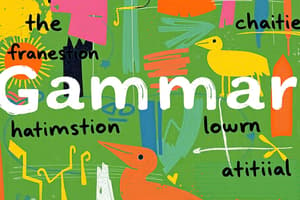Podcast
Questions and Answers
Which of the following is a characteristic of English modal auxiliary verbs?
Which of the following is a characteristic of English modal auxiliary verbs?
- They always end in ‑(e)s for the third-person singular
- They express modality such as possibility and obligation (correct)
- They have participles and plain forms
- They are not limited to a specific tense
What distinguishes English modal auxiliary verbs from other verbs?
What distinguishes English modal auxiliary verbs from other verbs?
- They can be used in any tense
- They always end in ‑(e)s for the third-person singular
- They are defective in that they do not have participles or plain forms (correct)
- They have participles and plain forms
Which verb is NOT a central English modal auxiliary verb?
Which verb is NOT a central English modal auxiliary verb?
- Might
- Ought (correct)
- Need
- Could
What is a common characteristic of the expressions 'had better' and 'ought'?
What is a common characteristic of the expressions 'had better' and 'ought'?
What do descriptive grammars of English differ slightly on regarding modal auxiliary verbs?
What do descriptive grammars of English differ slightly on regarding modal auxiliary verbs?
Which of the following verbs is NOT considered a central English modal auxiliary verb?
Which of the following verbs is NOT considered a central English modal auxiliary verb?
What distinguishes English modal auxiliary verbs from other verbs?
What distinguishes English modal auxiliary verbs from other verbs?
What is a common characteristic of the expressions 'had better' and 'ought'?
What is a common characteristic of the expressions 'had better' and 'ought'?
Which verb is inflected as 'might' in Modern English?
Which verb is inflected as 'might' in Modern English?
What do descriptive grammars of English differ slightly on regarding modal auxiliary verbs?
What do descriptive grammars of English differ slightly on regarding modal auxiliary verbs?
What is a defining characteristic of English modal auxiliary verbs?
What is a defining characteristic of English modal auxiliary verbs?
Which verb is NOT a central English modal auxiliary verb?
Which verb is NOT a central English modal auxiliary verb?
What is a distinguishing feature of the expressions 'had better' and 'ought'?
What is a distinguishing feature of the expressions 'had better' and 'ought'?
Which verb is inflected as 'might' in Modern English?
Which verb is inflected as 'might' in Modern English?
What do descriptive grammars of English differ slightly on regarding modal auxiliary verbs?
What do descriptive grammars of English differ slightly on regarding modal auxiliary verbs?
Flashcards are hidden until you start studying
Study Notes
Characteristics of English Modal Auxiliary Verbs
- English modal auxiliary verbs have a unique characteristic: they are defective, meaning they do not have a full set of inflected forms.
- English modal auxiliary verbs are distinguished from other verbs in that they lack certain inflected forms, such as a past participle or infinitive form.
Central English Modal Auxiliary Verbs
- The central English modal auxiliary verbs are can, could, may, might, shall, should, will, and would.
- Need is not considered a central English modal auxiliary verb.
Expressions 'Had Better' and 'Ought'
- The expressions 'had better' and 'ought' share a common characteristic: they are semi-modal, meaning they are not fully modal but have some modal-like properties.
- The distinguishing feature of 'had better' and 'ought' is that they are semi-modal and have some modal-like properties.
Inflection of Verbs
- The verb 'might' is inflected from the Old English verb 'mōgan'.
- The verb 'may' is not inflected as 'might' in Modern English.
Descriptive Grammars of English
- Descriptive grammars of English differ slightly on the classification and definition of modal auxiliary verbs.
- The classification and definition of modal auxiliary verbs vary slightly among descriptive grammars of English.
Studying That Suits You
Use AI to generate personalized quizzes and flashcards to suit your learning preferences.





